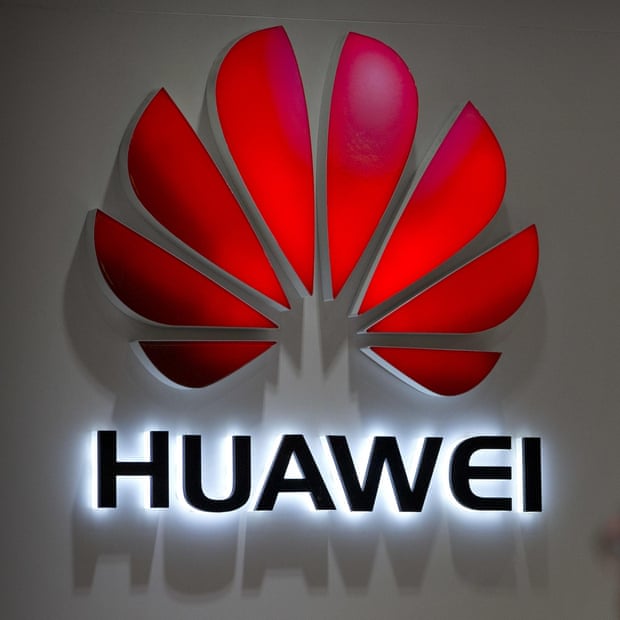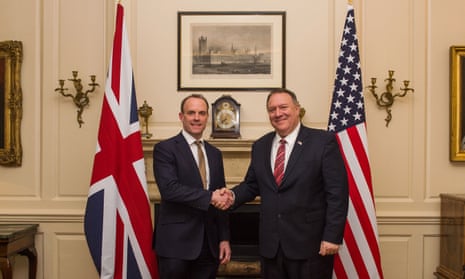The depth of American opposition to the UK granting the Chinese telecoms firm Huawei access to its 5G network has been underlined as the US secretary of state said the Chinese Communist party represented the central threat of our times, and had front-door access to Huawei systems.
He said the US would try to work through its differences with the UK decision announced this week but stressed the US would never permit its national security information to go across networks in which it did not have confidence.
Mike Pompeo, who is on a visit to London to meet Boris Johnson on the eve of the UK departure from the EU, was speaking alongside the foreign secretary, Dominic Raab.
Q&AWhat is Huawei and why is its role in 5G so controversial?
Show

Fast-growing Huawei is arguably China’s first global multinational. The Shenzhen-based company makes mobile phones, base stations and the intelligent routers that facilitate communications around the world.
But its success increasingly concerns the US, which argues Huawei is ultimately beholden to the Chinese Communist party and has the capability to engage in covert surveillance where its equipment is used.
Huawei is by some distance the world’s largest supplier of telecoms equipment with an estimated 28% market share in 2019. It was also the second largest phone maker in 2019, after Samsung and ahead of Apple.
But Australia banned Huawei from 5G in 2018, with its spy agencies declaring they were worried the company could shut down power networks and other parts of its infrastructure in a diplomatic crisis.
Trump banned US companies from working with Huawei last year and has strenuously lobbied others to follow suit, venting “apoplectic fury” in a phone call to Boris Johnson after the UK agreed to allow the Chinese company into 5G.
The company had successfully targeted the UK early on. It has supplied BT since 2003 and gradually expanded to the point where it agreed to create a special unit in Banbury, known as the Cell, where the spy agency GCHQ could review and monitor its software code. Vodafone is another key customer.
Britain’s intelligence agencies said in January that any Huawei risk could be managed as long as the company was not allowed to have a monopoly. As a result, Boris Johnson concluded Huawei’s market share should be capped at 35% for forthcoming high-speed 5G networks.
In July 2020 the UK position changed, and it was announced that Huawei is to be stripped out of Britain’s 5G phone networks by 2027. Oliver Dowden, the UK culture secretary, also announced that no new Huawei 5G kit can be bought after 31 December 2020 – but said that older 2G, 3G and 4G kit can remain until it is no longer needed.
Dan Sabbagh Defence and security editor
Asked if the US would reduce intelligence sharing with the UK due to the Huawei access to the UK network, Pompeo said: “We will never permit American international security information to go across a network that we don’t have trust and confidence in.
“That’s the standard, whether it is a Microsoft system, it is the same whether it is a Ericsson, a Nokia system, that’s the standard if it is a Chinese system.
“We will work with our UK counterparts, and I know the Australians, the New Zealanders, all others in the ‘five eyes’, will work together to ensure the systems are sufficiently secure and they are going to deliver the outcomes we need them to deliver, and that we have only a level of risk in the system that we find tolerable.
“I’m sure that we will protect American information to that standard.”
The tone of his remarks suggest the US regards the UK decision as an open negotiating point with room to still change. The US believes that with the decision also unpopular on the Conservative backbenches, in the months ahead it may in effect be nullified.
But Pompeo warned that the Chinese Communist party did not have “a technical back door to Huawei. They have the front door.”
He said the US had been making the case that having Huawei technology within the network was “very difficult to mitigate” and so was “not worth the candle”.
“When you allow the information of your citizens or the national security information of your citizens to transit a network that the Chinese Communist party has a legal mandate to obtain it creates risk.”
But Pompeo set the Huawei decision in the starkest context by saying the US now regards the Chinese Communist party as antithetical to US values and a bigger threat than terrorism.
Speaking later on LBC, Pompeo said: “We view the intrusion of the Chinese Communist party into information technology systems as a very great risk, a national security risk as well as a core privacy risk. If your health records are on a system that belongs and is controlled by the Chinese Communist party that is probably not something you would probably choose in the first instance.”
At the earlier event with Raab, he wished “Godspeed” to the UK’s departure from the EU, he underlined the tensions ahead by saying it was fantastic that the UK in future would be able to disalign from EU regulations, so making business with the US easier.
His remarks underline the extent to which the UK will come under US pressure in trade negotiations to maximise its distance from the EU, even though this may mean a more limited UK-EU trade deal.
Pompeo said: “The previous administration took the view that if the United Kingdom made this decision it would be at the back of the line. We intend to put the United Kingdom at the front of the line.”
Both Raab and Pompeo held back from predicting that a deal could be agreed before the US presidential elections this November.
Pressed to explain why the US had refused the UK government request to extradite Anne Sacoolas over the death of 19-year-old Harry Dunn last year, Pompeo simply said the case was an enormous tragedy and he was terribly sorry for the loss of a British citizen’s life.
He said “the US would do everything possible to make that right in a way that protects the important relationship between the two countries”. He said he was still working on a good resolution to the disagreement, but did not go into any specifics. Nothing he said suggested he was going to comply with the UK extradition request.
Raab rejected any suggestion that there could be a link between the Sacoolas extradition and the US requests for Prince Andrew to cooperate with the inquiry into his relationship with Jeffrey Epstein. Raab said one of the points of the discussions with the US was to ensure that such an episode did not reoccur, including a review of the extradition system.
Pompeo claimed the US policy of maximum economic sanctions on Iran was working, saying “the fewer dollars in the hands of the Ayatollah was a good thing”, describing Iran as the central threat to stability in the Middle East.
Although Raab agreed there had been wholesale non-compliance of the nuclear deal by Iran, he said the UK still favoured staying inside the nuclear deal since it “wanted to leverage Iran back into some kind of diplomacy negotiation to get compliance”.
He added: “If the JCPOA (the technical term for the nuclear deal) can be used to do that, that would be valuable.”
The US left the deal in 2018, prompting Tehran to take a succession of steps away from it in an attempt to leverage European nations to do more to boost trade with Iran.
Tehran now states it is free to take whatever steps it wishes to develop a civil nuclear power programme, but continues to allow the UN atomic inspectors to monitor and report on the Iranian programme.
Throughout the one-hour joint conversation at the Policy Exchange thinktank Raab referred to the creases in the US-UK special relationship, but focused on the shared objectives and values that bind the special relationship.










